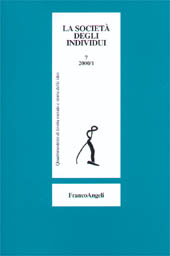Itinerari di riconciliazione. La filosofia socio-politica di Martin Buber
144-158 p.
This article presents the question of reconciliation, that is, the repair of several damaged axes of relationship, as the central issue of Martin Buber's socio-political philoso¬phy. In six paragraphs, it articulates: reconciliation with oneself of diasporic Jews, in the terms of overcoming alienation through appropriation and "striving for unity"; intragroup reconciliation, through the emergence of an anarcho-theocratic community in antithesis to nation-states; intergroup reconciliation, through the building of just relations between Jews and Arabs; intergroup reconciliation in an interreligious sense, redefining Jewish-Christian dialogue as grounded in difference of faith; intergroup Jewish-German reconciliation, as open confrontation with the adversary and ascription of individual agencies; extragroup reconciliation, that is, Buber's hope for a "great peace" through a shared humanity. [Publisher's text]
Is part of
Società degli individui : 80, 2, 2024-
Articles from the same issue (available individually)
-
Information
ISSN: 1972-5752
KEYWORDS
- Buber, dialogical thinking, reconciliation, Zionism, interreligious dialogue


